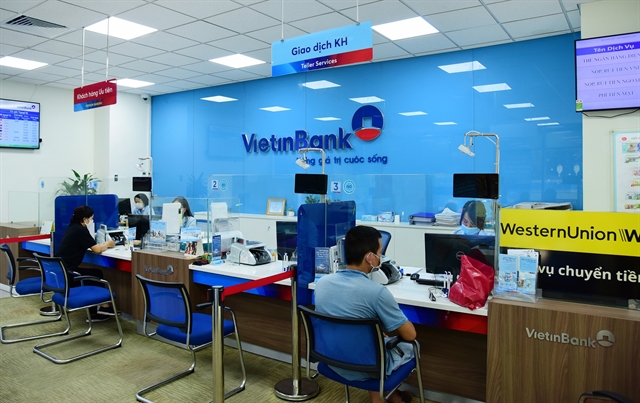 Economy
Economy

 |
| Customers at a VietinBank office in HCM City. — VNA/VNS Photo |
HÀ NỘI — Liquidity risk among Việt Nam's commercial banks remained low as major efforts have been taken in recent decades to bolster the banking sector's resilience, according to experts.
Experts said recent arrests of a number of large corporation's CEOs and management staff have not resulted in systemic damage to the sector, which was an indication of the sector's resilience.
Even prior to the arrests, a strengthening US dollar and the tightening of monetary policies by the US' Federal Reserve were putting Việt Nam's banks under pressure, according to VNDIRECT, an investment consultancy.
It has prompted the State Bank of Vietnam (SBV) to make policy adjustments to shore up the Vietnamese đồng (VND). However, liquidity risk has stayed low, in no small part thanks to the country's implementation of cashless payment systems and efforts to fight off the dollarisation of the economy.
According to VNDIRECT, improved public trust, lesser reliance on cash and stable macro-economic indicators were all contributing factors to a stronger and more resilient banking sector.
Among some 20 commercial banks in the country, 18 have completed requirements for Basel II, a set of recommendations on banking laws and regulations issued by the Basel Committee on Banking Supervision, with many on the way to completing Basel III with a focus on limiting risks.
The sector's profit will likely suffer, at least in the short term, according to Agribank Securities, as deposit interest rates have been on the rise while loan interest rates have been struggling to keep up.
The security firm, however, said there was still room for credit growth and capital injection, which can potentially address the above-mentioned issues in the long term. Earlier this month, SBV gave the green light to extend credit lines for VPBank, HDBank, MBBank and Vietcombank to infuse VNĐ83.5 trillion into the economy.
The sector's yearly target of 14 per cent credit growth remained the same. Meanwhile, Net Interest Margin (NIM) will likely experience slight decreases as inflation and deposit interest rates continue to climb. Banks that have managed to diversify their businesses and tap into the international financial market will likely be less affected.
Bancassurance is expected to alleviate some pressure on banks with the recently passed Law on Insurance Business set to come into effect next year.
The firm urged banks to continue building provisioning and pay attention to the bad debt ratio, which has increased to 10.4 per cent since the end of last year. Gradual decreases in corporate bonds and improved vetting processes were also recommended as the State was more than likely to tighten regulations for this market segment in the immediate future.
A recently approved plan to restructure the sector said the country's objective was to have at least two to three commercial banks in the top 100 strongest banks in Asia by 2025 with commercial banks' capital adequacy ratio reaching at least 10-11 per cent by 2023 and at least 11-12 per cent in the same year.
By law, a large commercial bank is required to build up capital to VNĐ15 trillion while the requirement for a medium-sized is set at VNĐ5 trillion by 2025. — VNS




